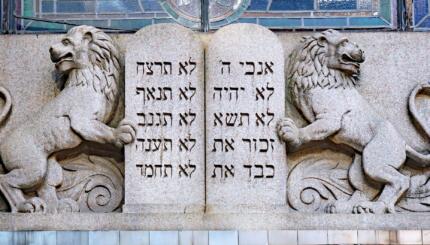As the article below describes, Reform Judaism (called here Liberal Judaism) was, for the most part, antagonistic to the early Zionist movement. However, as time went on, the movement, especially in the United States, began to warm to Zionism, eventually adopting an unambiguously Zionistic stance, which it maintains today. Reprinted with permission from Judaism Within Modernity: Essays on Jewish History and Religion (Wayne State University Press).
The opposition to international Zionism in Germany began with rabbis. In June of 1897, two Liberals, Heinemann Vogelstein of Slettin and Sigmund Maybaum of Berlin, expressed their opposition to the First Zionist Congress. A few weeks later, the Executive Committee of the Rabbiner-Verband in Deutschland (the general rabbinical association that included Conservatives as well as Liberals) issued a formal protest, which was endorsed the following year by a nearly unanimous voice vote of its plenum. As far as we know, no German rabbi present at that meeting voted against the resolution. Only two, the Liberal Leo Baeck and the Conservative Saul Kaatz, chose to abstain.
Danger to the Status Quo
In the years that followed, religious Liberals, with few exceptions, remained adamant in their opposition to the new movement. Some of their arguments had little to do with religion: Zionism was a danger to Jewish political status in Germany, a spur to anti-Semitism. But especially among the rabbis, other contentions appear as well, whose main purpose is to declare the Jewish illegitimacy of Zionism–not because it was “forcing the messianic end” (the reason Orthodox opponents often castigated it), but because it was a misunderstanding of Jewish history and destiny.
 Among the Liberals, the chief spokesmen for the religious critique of Zionism were Rabbis Heinemann Vogelstein of Stettin and Felix Goldmann of Oppeln (and later Leipzig). Of the two, Vogelstein was older and less compromising, Goldmann more profound and less dogmatic. Though organizationally a leader of Liberal Judaism, Vogelstein was not an original thinker. His generation within the Reform movement had received the heritage of Abraham Geiger [one of the founding thinkers of the German Reform movement] and his contemporaries intact and added little to it themselves.
Among the Liberals, the chief spokesmen for the religious critique of Zionism were Rabbis Heinemann Vogelstein of Stettin and Felix Goldmann of Oppeln (and later Leipzig). Of the two, Vogelstein was older and less compromising, Goldmann more profound and less dogmatic. Though organizationally a leader of Liberal Judaism, Vogelstein was not an original thinker. His generation within the Reform movement had received the heritage of Abraham Geiger [one of the founding thinkers of the German Reform movement] and his contemporaries intact and added little to it themselves.

Help us keep Jewish knowledge accessible to millions of people around the world.
Your donation to My Jewish Learning fuels endless journeys of Jewish discovery. With your help, My Jewish Learning can continue to provide nonstop opportunities for learning, connection and growth.
Vogelstein’s reaction to Zionism was therefore basically an attempt to point out where the new movement contradicted the accepted heritage. He put it very directly: Judaism means the religion of the prophets of Israel understood as faith in a universal, moral God and the Jewish mission to bring its tiding to humanity. Since Zionism undermined that faith, especially among the young, it constituted a serious danger to the future of Judaism no less than to the political future of German Jews.
Anti-Atheism
Goldmann, who considered himself a non-Zionist rather than an anti-Zionist, drove to the heart of the matter: Zionism represented a fundamentally different and contradictory understanding of Jewishness. It held that one could be an atheist and at the same time a perfectly good Jew. The Zionists could afford to be neutral and even indifferent to religion, but Liberal Judaism could not adopt that position.
While there were indeed Jews who called themselves Liberal and cared little about religion, Goldmann saw them on that account as Jewishly inadequate. Their Jewishness was simply an “Abwehrjudentum” (Judaism defined in terms of defense), and despite Zionist claims, that was not what Liberal Judaism was all about. Assimilated Jews were indeed the norm, but they stood outside both camps, the common prey of Liberals no less than Zionists. Like the Zionists, Goldmann’s goal was to win them over to a more content-rich Jewishness. But that basic content had to be religion, not nationhood, for, as he argued, only Judaism as a religion was historically authentic. And because Judaism, unlike Jewish nationalism, was eternal and not temporal, it alone could assure Jewish survival.
For the most part, Liberal rabbis and laity in Germany continued to see Liberal Judaism and Zionism as fundamentally contradictory. Theoretical nuances were generally lost in the midst of vigorously fought community elections and persistent outcroppings of anti-Semitism that kept anxieties at a high pitch. Increasingly, Liberal Jews sensed that the Zionists were successfully alienating some of their own offspring, “dripping the Zionist poison into the souls of the children,” as one of them put it.
In 1912, lay leaders of Liberal Judaism were instrumental in forming an Antizionistisches Komittee (Anti-Zionist Committee), and most of them continued throughout the Weimar period to regard the practical fight against Zionism as a basic imperative of their Liberalism. However, by the early Weimar years, the Liberal rabbinate was neither consistently nor unambiguously anti-Zionist.
A Softening of Opposition
In 1918 even Goldmann acknowledged that Jewish nationalism was unobjectionable, provided only that it would recognize the primacy of Judaism as a religion. Religious Jews could legitimately be members of the Zionist organization, according to Goldmann, as long as they did not share the prevalent national view that religion was a dispensable manifestation of Jewishness–as long as they continued to consider religion its essence.
Rabbi Caesar Seligmann went further. Although he never joined the ranks of the Zionists, and like Goldmann, continued to insist upon the primacy of religion, Seligmann paid early tribute to its beneficent effect in restoring Jewish self-consciousness to alienated Jews, and by 1918 he could regard their roles as complementary. Both were striving to preserve Judaism, “we through preservation of the Jewish religion, they through preservation of the community.” In Martin Buber, a Zionist and a non-Orthodox believer, Seligmann found points of contact with Liberal Judaism.
Although Hermann Cohen [one of the most influential Reform thinkers] did not associate himself organizationally with Liberal Judaism, he was widely regarded as its most respected spokesman. His position on Zionism was similar to that of the more moderate among the Liberal rabbis and laity. Like them he could not conceive of a Jewishness that did not have ethical monotheism as its essence and did not strive for a universal messianic fulfillment. But like them also, he realized that the religious definition was not exhaustive. Judaism, he held in 1916, was not, as the Zionists believed, a nation, but it was a “nationality.”
As such, and not as a religion alone, it could coexist within the German state. That, of course, did not make Cohen a Zionist. On the contrary, like the rabbis mentioned above, he continued to see Liberal Judaism and Zionism as struggling against one another for the minds and hearts of German Jewry.


